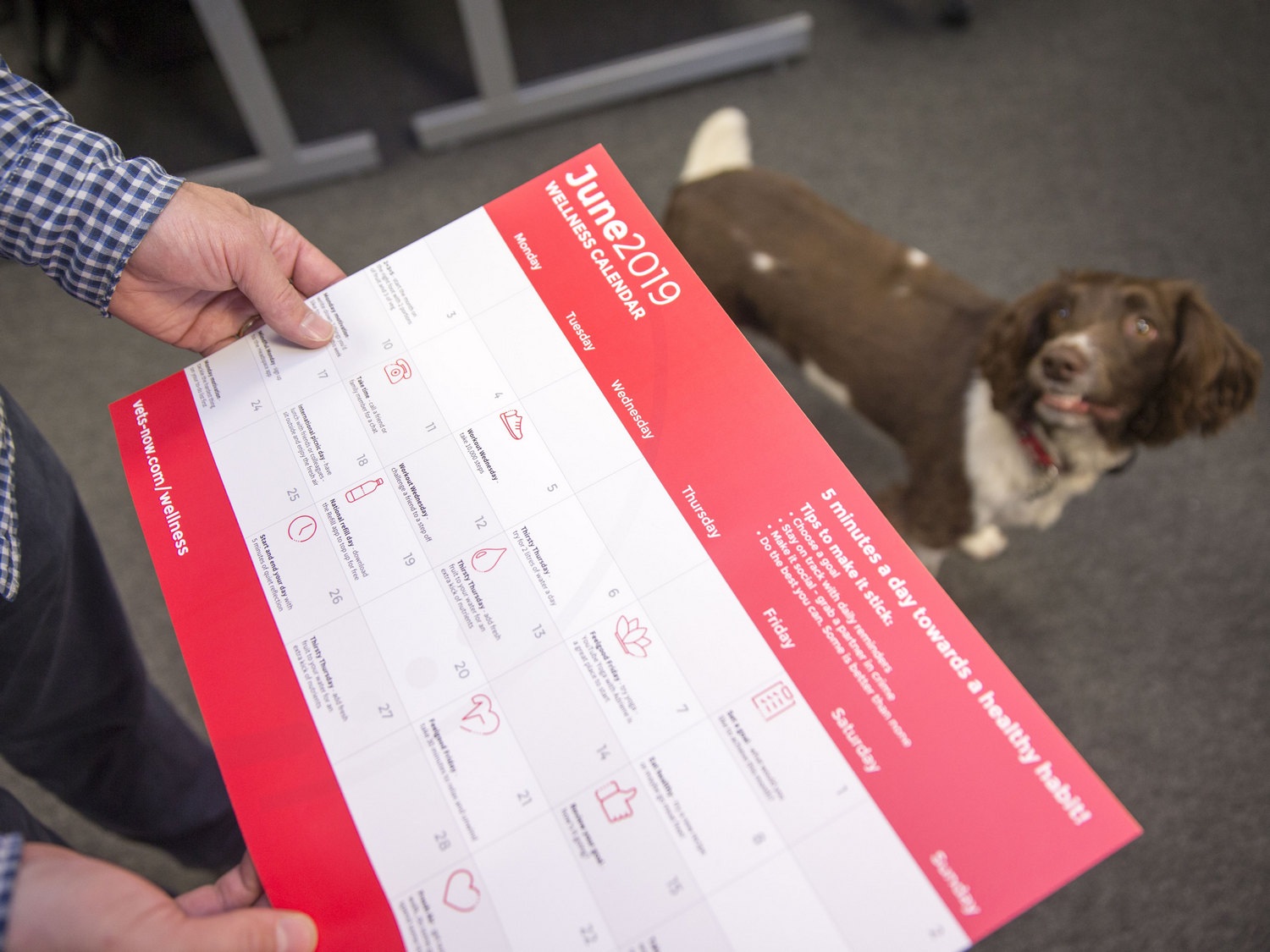Maintaining a healthy lifestyle can be challenging when working out of hours
While it can be tempting to grab a convenient snack to stave off those hunger pangs during a busy night shift, doing this regularly can lead to weight gain, diabetes and even cardiovascular disease.
As part of Vets Now’s Wellness Month, we’ve enlisted the help of Lily Soutter, one of the country’s leading nutritionists, to find out how to maintain a healthy lifestyle while working out of hours. Here, Lily shares nine smart-eating strategies to help boost your health, energy and brainpower during your shift.

Interested in a career at Vets Now?
If you think a career in ECC is for you, view our current vacancies to find your perfect role.
View vacancies1. Get off the blood sugar roller coaster
Did you know that consuming just two 300ml sugary drinks each day would add up to a huge 22kg of sugar in one year? While it may be tempting to rely on sugar to improve alertness, many options can result in blood sugar highs and lows. Low blood sugar can lead to energy slumps, lack of concentration, irritability and may stimulate further cravings for sugary ‘quick fix’ foods.
Instead, opt for snacks which provide sustained energy and maintain stable blood sugar. By combining protein, fibre and a little healthy fat with your carbohydrate source, you can slow the rate at which sugar is released into the bloodstream.
For example:
- Wholegrain toast (carbohydrate + fibre) and poached egg (fat + protein) = slow release energy
- White toast (carbohydrate) and jam (carbohydrate) = fast release energy
2. Choose your carbohydrates wisely
Our brain relies on sugar to function and uses as much as 20% of all energy required by the body. All carbohydrates break down to sugar, however, only the slow-release and fibre-rich carbohydrates provide us with sustained fuel all day long. Opt for whole grain carbohydrates such as brown rice, brown bread, brown pasta, chickpeas, lentils, beans, quinoa, oats, beans, and leave the skin on your potato.
3. Eat your way to a smarter brain with smart fats
60% of the brain is made up of fat and omega 3 fats are critical for the brain’s integrity and ability to perform. Aim to consume two portions of fish a week, one of which should be of the oily variety – try salmon, mackerel, herring, sardines and anchovies. Alternatively, opt for 2 tbsp. of chia or ground flax seeds on a daily basis.

4. Protein – little and often
Protein has satiating properties and maintains muscle mass, both of which play a role in maintaining a healthy body weight. We don’t need a high protein diet, but we should aim to incorporate protein into every meal and snack. Try lean meat, fish, natural yoghurt, eggs, tofu, tempeh, beans, lentils, chickpeas, nuts and seeds.
5. Preparation is the key to success
If you have the right food to hand then you’re more likely to make healthier choices when those sugar cravings hit. While many of us have sugar cravings, consuming neat sugar straight off the spoon seems rather unappetising. Instead, we crave a combination of sugar and fat, which provides those moreish and hyper-palatable qualities.
If opting for a healthier sweet snack, choose a mix of sugar and a small amount of healthy fats for their satisfying properties – try apple (sugar) dipped in no-added-sugar nut butter (fat), or a banana (sugar) with unsweetened FAGE Total Greek yoghurt (fat).
6. Vitamin D
It’s impossible to get enough of this sunshine vitamin during the winter months, and even harder during shift work. Which is why we should consider supplementing with 400IU vitamin D daily between October and April, and if you’re devoid of daylight then potentially all year round.
Vitamin D plays a key role in bone health, but also helps fight coughs and colds and even plays a role in our moods.

7. Don’t forget to hydrate
Dehydration can result in low energy, headaches, poor mood and lack of concentration Research has also shown that even mild dehydration (1-2% loss of body weight), can reduce short-term memory and impact cognition test scores.
If you want to feel and perform at your best then staying hydrated can really set you up for success.
8. Be mindful of meal timings
Aim for three meals and consider two to – three snacks over a 24-hour period. Plan to eat within one hour of waking and don’t skip your first meal of the day.
9. Caffeine – choose your sources wisely
It may be tempting to rely on caffeine for energy, however, too much of this stimulant can disrupt sleep and will further interfere with our natural body clock. Instead try calming herbal teas such as lemon balm and chamomile, or even valerian root for sleep.
But if you really need a brain boost, you could opt for matcha green instead. Whilst matcha still contains caffeine, it’s also rich in L-theanine which has been shown to stimulate feelings of relaxed alertness and clarity.
